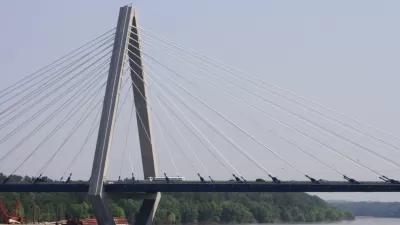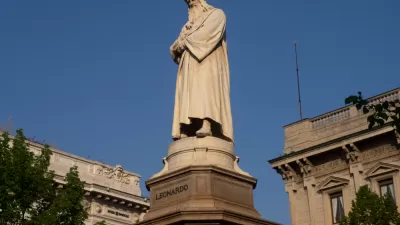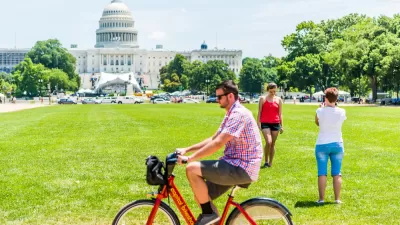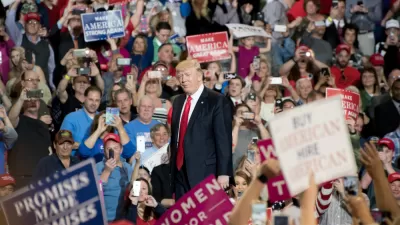President Trump is not the only one proposing a huge infrastructure plan—Senate Democrats have their own. The cost is the same, but financing is different. The Democrats' plan does just what Senate Majority Leader Mitch McConnell warned against.

Senate Democrats support the proposal by President Trump to invest $1 trillion in an infrastructure plan. It's how to pay for it where they differ.
"That is something that congressional Democrats have sought for years, but congressional Republicans have stymied us at every turn," Senate Minority Leader Charles E. Schumer (D-N.Y.) said at a press conference Tuesday, Jan. 24, reports Alexander Bolton for The Hill.
Schumer, however, is not interested in only cutting taxes to help private companies build toll roads. “We will not support tax credits for developers,” he declared.
“That’s not the American tradition; ask Dwight D. Eisenhower,” Schumer said of using tax incentives to promote the creation of toll roads, referring to the nation’s 34th president, who oversaw the creation of the American interstate system.
Of course, if President Eisenhower was alive, he would state that financing the nation's highway system in 1956 was a very contentious issue, although Schumer is correct in that tax incentives weren't used. Instead, after much debate, Congress settled on using gas taxes and user fees to finance the 48,000 mile, toll-free Interstate Highway System.
A one cent per gallon tax was approved, increasing the federal gas tax to three cents per gallon, plus "highway user tax revenue from excise taxes on gasoline, tire rubber, tube rubber, and the sales tax on new trucks, buses, and trailers would be credited to a new Highway Trust Fund and reserved for use on the Interstate System and other highway projects," according to The Rambler, the FHWA's highway history webpage on the federal gas tax.
Trump/Republican plan
Schumer wants the federal government to pay the tab, going against the direction of Senate Majority Leader Mitch McConnell (R-Ky.), who "told reporters last month the level of the national debt 'is dangerous and unacceptable' and pledged to oppose anything resembling the massive infrastructure spending bill President Barack Obama enacted in his first year in office," writes Bolton.
Trump’s campaign recommended “leverag[ing] new revenues” and forming public–private partnerships to incentivize the investments in transportation, clean water, a modern electrical grid and security infrastructure.
Republicans in Congress have embraced the idea of creating tax breaks to spur private infrastructure investment and have warned against any plan that would require massive allocations of federal dollars.
McConnell at [the Jan. 23] meeting at the White House reiterated his view that any package considered by Congress this year needs to be paid for and not add to the deficit.
Polling
A Reuters-Ipsos poll released Jan. 19 shows that Americans prefer a tolling approach to funding the infrastructure plan, with taxes coming in second. A debt-financed approach was least favored. However, when asked only if they would support using tax credits and tolls, and given no alternatives, two-thirds disapproved.
FULL STORY: Dems unveil infrastructure plan, reach out to Trump

Alabama: Trump Terminates Settlements for Black Communities Harmed By Raw Sewage
Trump deemed the landmark civil rights agreement “illegal DEI and environmental justice policy.”

Planetizen Federal Action Tracker
A weekly monitor of how Trump’s orders and actions are impacting planners and planning in America.

Why Should We Subsidize Public Transportation?
Many public transit agencies face financial stress due to rising costs, declining fare revenue, and declining subsidies. Transit advocates must provide a strong business case for increasing public transit funding.

Understanding Road Diets
An explainer from Momentum highlights the advantages of reducing vehicle lanes in favor of more bike, transit, and pedestrian infrastructure.

New California Law Regulates Warehouse Pollution
A new law tightens building and emissions regulations for large distribution warehouses to mitigate air pollution and traffic in surrounding communities.

Phoenix Announces Opening Date for Light Rail Extension
The South Central extension will connect South Phoenix to downtown and other major hubs starting on June 7.
Urban Design for Planners 1: Software Tools
This six-course series explores essential urban design concepts using open source software and equips planners with the tools they need to participate fully in the urban design process.
Planning for Universal Design
Learn the tools for implementing Universal Design in planning regulations.
Caltrans
Smith Gee Studio
Institute for Housing and Urban Development Studies (IHS)
City of Grandview
Harvard GSD Executive Education
Toledo-Lucas County Plan Commissions
Salt Lake City
NYU Wagner Graduate School of Public Service





























